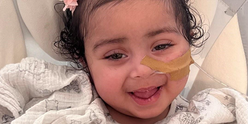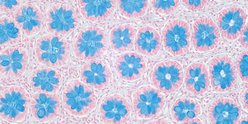GOSH Charity awards £6 million to research
5 Jun 2025, 10:27 a.m.
Great Ormond Street Hospital Charity (GOSH Charity) has awarded over £6 million towards three transformational programmes of research into rare and complex child health conditions.
Launched in 2024, the Programme Grant Scheme is the largest research funding call in our history.
We hope that the scheme, which calls for ambitious, large-scale research projects, will create a step change in rare paediatric disease research.
The scheme encourages collaboration, aiming to bring together world-leading experts from different disciplines to deliver maximum impact for seriously ill children and their families.
The successful programmes
Three programmes of work have been awarded through this scheme – all of which impressed our expert advisory groups in terms of scientific quality, deliverability and patient impact.

Programme Grant Researchers, from left to right: Professor Claire Booth, Professor Waseem Qasim, Dr Karin Straathof
1. Safer, more effective, gene therapies for a broader range of rare inherited diseases
£2.6 million will help Claire Booth, Mahboubian Professor in Gene Therapy at the UCL Great Ormond Street Institute of Child Health (UCL GOS ICH) and Consultant in Paediatric Immunology at Great Ormond Street Hospital (GOSH), to create safer, more effective gene therapies for a broader range of rare diseases. Initially focusing on developing new treatments for patients with inherited immune system disorders, the work is expected to be easily transferable to many other inherited diseases.
“Recent scientific advancements have paved the way for groundbreaking progress in gene therapy, allowing us to precisely correct mutations in stem cells with greater efficiency and safety. In this program, we will introduce these cutting-edge technologies at GOSH, reinforcing our status as a global leader in the field and ensuring that safer, more targeted gene therapies are accessible to our patients.”
Professor Booth is recognised globally for successfully advancing promising gene therapy treatments from lab bench to patient bedside, directly impacting patients’ lives. In 2021, her team collaborated with the University of California, Los Angeles to bring hope to patients with ADA-SCID (a rare and potentially fatal immune system disorder) by showing the potential of gene therapy to restore their immune system. Professor Booth and her team, with support from GOSH Charity and LifeArc, are also exploring new models of access for life-changing gene therapies, to ensure that children living with rare diseases can gain access to vital treatments that have been proven to work.
2. Exploring how to make gene-editing techniques safer and more accessible for rare blood cancers
£2.4 million will support a team effort coordinated by Waseem Qasim, Professor of Cell & Gene Therapy & NIHR senior investigator at the UCL GOS ICH and Consultant in Paediatric Immunology and Bone Marrow Transplant at GOSH, to explore how to make gene-editing techniques safer and more accessible for different types of childhood leukaemia, as well as other blood and immune disorders. Through this work, they hope to extend the use of ‘ready-made’ CAR T-cells (engineered immune cells that target and kill cancer cells) from healthy donors to treat childhood leukaemias that haven’t responded to chemotherapy.
“It’s fantastic news that GOSH Charity is supporting new work to bring advances in genome engineering closer to clinic. The funding will allow scientists and medical teams working both in the NHS and Universities to work closely in harnessing these rapidly developing technologies for the benefit of our young patients.”
Professor Qasim is a pioneer in developing innovative gene editing techniques, and since 2015 the team has demonstrated how emerging genome-editing techniques can help children. Most recently, they used a technique called base-editing that can change single letters of DNA code in the world’s first treatment for ‘incurable leukaemia’.
3. Creating specialised CAR T-cells to treat a rare childhood brain tumour
£1.3 million will fund Dr Karin Straathof, Honorary Consultant Paediatric Oncologist at GOSH and Associate Professor in Tumour Immunology at UCL Cancer Institute, and her team to create specialised CAR T-cells to treat a rare childhood brain tumour called diffuse midline glioma (DMG). There is currently no cure for DMG, with fewer than 10% of patients surviving longer than two years past diagnosis.
“For tumours that grow in delicate parts of the brain, such as DMG, we currently do not have effective treatments. Immunotherapy has shown early promise as a new treatment approach. I am delighted that our team has been awarded this programme grant. I have no doubt this will accelerate development of an effective T-cell immunotherapy for DMG.”
Dr Straathof’s research is looking at how CAR T-cells can be engineered to tackle childhood solid tumours. Her work led to one of the first phase I clinical studies of CAR T-cell therapy for children with relapsed or refractory neuroblastoma – a rare cancer that develops in nerve tissue. She is now leading two further clinical trials investigating CAR T-cell therapy for DMG.
Transforming the lives of patients and families at GOSH and beyond
The Programme Grants form part of our £70 million five-year research strategy, which aims to transform the lives of children through research-led care. As the UK’s largest charity dedicated to funding paediatric research, we know that research is vital to offering new solutions and treatments for children with rare or complex conditions and are committed to accelerating progress in children’s health.
“GOSH Charity is thrilled to have awarded programmatic funding through our largest ever research funding scheme. This aims to bring together world-leading researchers to transform the lives of patients and families at GOSH and beyond. Funding this research can create a step change in our understanding of rare and complex paediatric disease to find more effective treatments, cures and interventions for children.”
We will be following the progress of these grants over the next four years and look forward to seeing the impact of the research for seriously ill children and their families. Find out more about GOSH Charity's Programme Grants and other schemes on our research funding schemes pages.






